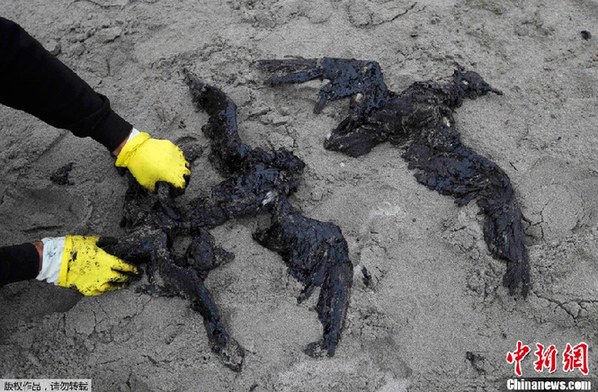Rare birds recovering from maritime oil spill
 0 Comment(s)
0 Comment(s) Print
Print E-mail Xinhua, March 28, 2013
E-mail Xinhua, March 28, 2013
One of the world's rarest birds appears to have recovered in numbers after New Zealand's worst-ever maritime environmental disaster, experts announced Wednesday.
 |
|
About 120 dotterels were in the area when the Rena grounded on the Astrolabe Reef, off the eastern North Island on October 5, 2011. [File photo] |
Monitoring of the New Zealand dotterel population, which is endangered and estimated to number just 1,700 in the wild, showed birds captured after the oil spill from a Liberian-registered cargo ship in October 2011 had recovered well, according to the Massey University.
About 120 dotterels were in the area when the Rena grounded on the Astrolabe Reef, off the eastern North Island, and 60 were taken into captivity to keep them out of the path of the oil and kept as an "insurance" population.
Relocation of the birds and release elsewhere would have only resulted in them quickly returning to their breeding territories, said a statement from the university.
Independent shorebird ecologist Dr. John Dowding, who had been monitoring the birds since they were released at the end of 2011, said more than three-quarters of the dotterels taken into captivity were alive a year later.
"There were some losses in the first month after release -- probably due to the respiratory condition that killed six birds while they were captive -- but after that survival has been normal, " Dowding said in the statement.
Once dotterels begin breeding, they typically remain at the same site for many years.
"As it was not always possible to catch both birds in a pair, some pairings were disrupted during the pre-emptive capture," he said.
However, most of the survivors were paired and breeding again and numbers at most of the important sites were similar to those before the grounding.
"This is an encouraging result. Dotterels can live for up to 30 years, and the one season of disruption needs to be viewed in that context."
Monitoring for longer-term effects would continue, but the results justified the capture.
"In spite of some losses, the captive population would have been sufficient to allow the regional population to re-establish, had the remaining wild population been lost to oil."
The Rena spilled hundreds of tons of oil into the sea along with cargo containers and their contents, killing an unknown number of New Zealand's native birds and prompting a massive clean- up of oil and debris from beaches around the port city of Tauranga.






Go to Forum >>0 Comment(s)